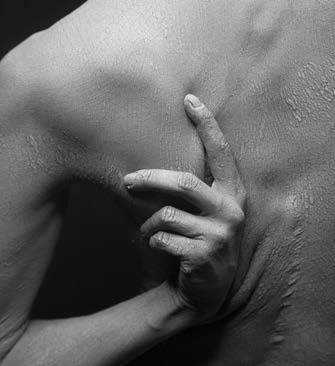There isn’t much I remember about the church of my childhood except stuffy, will-they-ever-end church services, my Sunday school teacher, who preferred talking about baseball and those uncomfortable itchy wool pants my parents made me wear on Sundays, even on steamy hot summer’s days.
Since then, I haven’t given much attention to itching, except to avoid wearing similar pants whenever I can.
That was until a recent article in the journal “Nature” tweaked my interest in the physiological and molecular basis of itching.
Last year the Nobel prize in medicine/physiology was awarded to David Julius and Arden Patapoutian for their studies of light touch, temperature and pain sensations.
In independent but complementary studies, Julius and Patapoutian were able to link specific qualities and sensitivities of sensation to specific genes in nerve cells and the receptor proteins at the sensing tips of the related nerve fibres.
Their work was elegant but left one question unanswered: Which nerve cells and receptor proteins mediate itching sensation?
Mechanoreceptors that respond to deforming stimuli such as touch, pressure or stretch, are ubiquitous in the skin and many of the body’s systems and organs.
For example, mechanoreceptors and their related nerve cells and sensory connections provide important information about distension and pressure within the urinary tract from the kidneys through to the urethra, the digestive system from mouth to anus, blood pressure in blood vessels, tension and stretch in muscles, and touch and stretch stimuli applied to the skin.
And provided everything is working as it should, we’re barely aware of most of that information.
Itch stimuli on the other hand, are hard to ignore – they are irritating, annoying and might even be painful. They force us to pay attention, sometimes prompting us to rub or scratch the affected region of the skin, often making the itch worse.
The “Nature” study strongly suggests the nerve cells that mediate itch sensation differ from other sensory nerve cells.
Some cells and their related receptor protein respond to chemicals such as histamine, which is typically released in response to insect bites and more so by scratching the site of the bite.
Histamine is also released in allergic disorders affecting the skin – hence the itch and scratching so often associated with such problems.
Other sensory nerve cells and their related receptor proteins respond to mechanical stimuli, not unlike other low threshold mechanosensitive receptors and neurons described earlier by Patapoutian and colleagues.
But with a difference.
In the case of itch sensitive mechanoreceptors, the nerve cells and their receptors become sensitized to the stimulus, creating a prolonged and even lower threshold response to touch, hence the itch.
For me, the result of this latest study was a reminder of just how complex the sensory system is.
There are many types of sensory nerve cells each with their own unique genes, differing receptor proteins and different functions, implying much more complexity in the spinal cord, brainstem and higher components of the sensory system.
To do what we do, requires a lot on information, 99 per cent or more of which we’re thankfully unaware. We are aware of the external and internal worlds on a need-to-know basis and itch is one of those need-to-knows – that alerts us to an insect bite or possibly allergic or inflammatory condition in our skin.
But there’s more to the story. The work that earned Julius and Patapoutian a Nobel revealed the underlying genetics of the peripheral sensory system and raised the possibility that some sensory disorders might be genetically transmitted and hence possibly treated using gene editing.
Their studies and those of others, also raise the possibility of developing drugs for treating different sensory disorders, by targeting specific receptor proteins.
Those would be big advances, but probably not any time soon, given the complexity of the sensory system.
Dr. William Brown is a professor of neurology at McMaster University and co-founder of the InfoHealth series at the Niagara-on-the-Lake Public Library.










